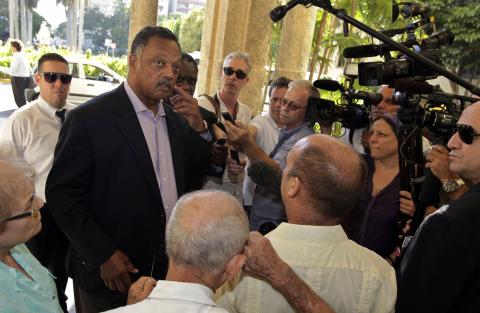Advertisement
Colombia FARC Rebels Ask Jesse Jackson To Assist Hostage Release
BOGOTA (Reuters) - Colombia's FARC rebels called on Saturday for U.S. civil rights activist Jesse Jackson to oversee the release of a former U.S. Marine they kidnapped in June while he trekked through jungle in a known guerrilla zone despite warnings of the risks.
On a visit to Colombia 10 days ago, Jackson called on the FARC to release Kevin Scott Sutay, a gesture he said would help peace negotiations with the government.
In a statement on Saturday, the FARC said it wanted Jackson himself to assist with Sutay's release.
"The FARC-EP have taken the decision to solicit that Reverend Jesse Jackson makes available to this effort his experience and probity to expedite the liberation of Kevin Scott," the FARC said in a statement.
Sutay, a veteran of the war in Afghanistan, had been backpacking through several Central and South American countries. He was captured by the FARC after being warned by police to abandon his plans to hike through what they called a "red zone" for rebel activity.
The FARC looked ready in July to release Sutay to the International Committee of the Red Cross. After initially describing him as a "prisoner of war," it hardened its stance and accused him of being a mercenary after President Juan Manuel Santos refused its demand that a leftist senator, Piedad Cordoba, oversee the release.
Santos had also said he would deny the rebels the chance of making a "media show" of the hostage's release. Until its appeal to Jackson, the FARC had made no further mention of plans to release him.
Jackson is on a visit to Cuba to promote better relations between the communist-run island and the United States.
Cuba has been hosting peace talks between the FARC and Colombia's government since last November that aim to end a five-decade conflict that has killed more than 200,000 people.
The FARC was set up in 1964 as a communist-inspired peasant army fighting to reduce inequality and redistribute land. Its numbers have been roughly halved by a decade-long U.S.-backed government offensive.
The rebels said in February 2012 they would stop taking hostages to raise money for their armed struggle, but reserved the right to continue taking prisoners of war.
(Writing by Peter Murphy; Editing by Peter Cooney)



















Add new comment